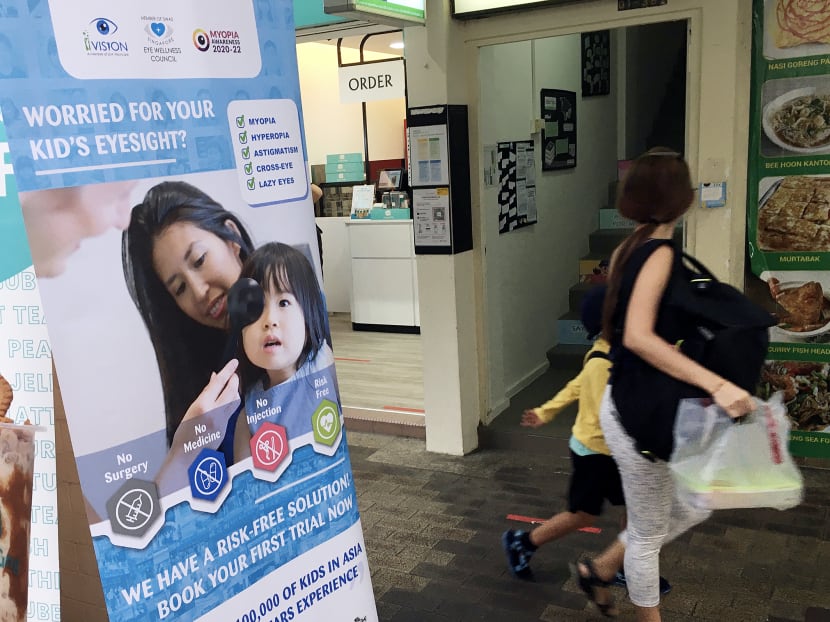HSA investigates SLM Visioncare, ICC Visioncare, which have touted cures for myopia, following complaints
SINGAPORE — The Health Sciences Authority (HSA) is investigating two companies who have been advertising their treatments to cure myopia after receiving two complaints against the firms.
- HSA has received two complaints against SLM Visioncare and ICC Visioncare, which claim that their therapy methods can help patients recover from myopia
- MOH has also received six complaints about SLM Visioncare
- The ministry said healthcare firms are not allowed to advertise treatments to diseases or medical conditions
- Eye specialists said they are not aware of any scientifically proven cures for myopia
SINGAPORE — The Health Sciences Authority (HSA) is investigating two companies, SLM Visioncare and ICC Visioncare, which have been advertising their treatments to cure myopia after receiving two complaints against the firms.
In a response to queries from TODAY, HSA said it is investigating them for possible contraventions of the Health Products (Medical Devices) Regulations.
Separately, the Ministry of Health (MOH) said it is investigating SLM Visioncare, after receiving six complaints against them.
SLM Visioncare claims on its website that it uses physiotherapy to help “improve the blood circulation and elasticity” of the eyes' ciliary muscles — which controls the focusing of the eye — and this will help patients recover from myopia naturally with no adverse side effects.
It also states on its website that its therapies are “especially effective” for children aged between six and 16.
Meanwhile, ICC Visioncare claims that more than 100,000 customers with vision impared conditions have “successfully restored their original eyesights” through its treatments.
In response to TODAY’s queries, SLM Visioncare said it questioned the authenticity of these complaints and that in 30 years of operating in Taiwan, Hong Kong and China, and four years in Singapore, it has received almost no complaints.
TODAY has reached out to ICC Visioncare for their response.
MOH in its reply to TODAY however, said that under the Medicines (Advertisement and Sales) Act, companies which provide healthcare services are not allowed to advertise any services or skills relating to the treatment of any disease or medical conditions including myopia.
“This is so as not to mislead or induce any individuals from seeking the advice or services from the advertiser or any person referred to in the advertisement,” said the ministry.
CHILDREN'S EYE CONDITION WORSENED AFTER TREATMENT: PARENTS
TODAY spoke to two customers who sent their children to be treated at SLM Visioncare.
Mr Daniel Wang said he paid S$2,490 to send his 10-year-old-son for myopia treatment at SLM Visioncare at least three times a week for three months.
According to the 40-year-old sales manager, his son’s eye condition showed no improvement and a check at a public hospital found that his condition worsened.
Another customer, who wanted to be known only by her initials CP, said her son’s eyesight has deteriorated since going for the treatments.
The senior manager at an engineering firm bought a 60-session package for S$3,800 for her six-year-old after coming across the company’s advertisement on Facebook.
She has since made a complaint to the Consumer Association of Singapore (Case).
Case said in response to TODAY’s queries that it has received 11 consumer complaints against SLM Visioncare between Jan 1 last year and Nov 16 this year.
CUSTOMERS ARE TOLD RESULTS WILL VARY: SLM VISIONCARE
SLM Visioncare said that the complaints may have been started by “disgruntled ex-employees” who are preparing to set up a similar company.
It added that its vision care and eye exercises require customers to follow “strict instructions” including a strict vision care schedule — where customers have to visit one of its centres three times a week — perform a daily 30 minute eye exercise and actively correct his or her eye habits.
“We have always made it known to customers that results may vary from person to person, depending on the diligence of each customer in adhering to the instructions and practices that have been recommended,” said SLM Visioncare.
One satisfied customer, who wanted to be known only as Mr TC Ho, said his 11-year-old daughter no longer needs to wear her spectacles after attending 11 sessions with the company last year.
Apart from her vision, her astigmatism also improved after the therapy sessions, he said.
Though they have stopped going for the sessions regularly, he makes sure that his daughter continues with the recommended eye exercises at home for maintenance, said Mr Ho, who signed up for a S$1,900 package with the firm.
‘NO CURE’ FOR MYOPIA: SPECIALISTS
Ophthalmologists, however, told TODAY that they are not aware of any scientifically proven cures for myopia and astigmatism.
Dr Lam Pin Min from Eagle Eye Centre said in his years of experience managing children with refractive errors such as myopia, astigmatism and strabismus, he is unaware of any scientifically proven “physiotherapy technology” that is able to reverse these eye conditions.
The director of pediatric ophthalmology and adult strabismus service added that touted treatment methods must go through rigorous clinical trials to prove its efficacy and safety before they can be used to treat patients.
“We would need to review the results of such clinical trials, if any, in order for us to make any endorsement of the efficacy and safety of these treatments,” said Dr Lam, who is a former Senior Minister of State for Health.
Ms Chui Wen Juan, vice president of the Singapore Optometric Association, said physiotherapy which claims to help blood circulation and increase the elasticity of the eyes will not help in treating and reversing conditions such as myopia, far-sightedness and astigmatism.
Using eye anatomy and scientific jargon without clear explanations about these conditions can cause misinformation, she said. It can also deceive the public into believing unvalidated “cures”.
Worst of all, it can delay proper treatment and management in children, as some of these conditions are time-sensitive, said Ms Chui.
Dr Jerry Tan, a senior consultant and eye surgeon, said selling myopia cures is “like selling snake oil”.
“Myopia affects people whose eyeballs are too long or corneas are too curved. Those are physical things that cannot be changed,” said Dr Tan from Jerry Tan Eye Surgery.
Though pseudomyopia — a spasm of the ciliary muscle which prevents the eye from focusing in the distance — can be improved with eye exercises, it will still not cure true myopia, which is anatomical, he said.
REGULATIONS IN PLACE
In its reply, MOH added that there are regulations in place for the practice of optometry and provision of medical devices by optometrists and opticians to safeguard consumers.
Under the Optometrist and Opticians Act, which regulates the practice of optometry and opticianry in Singapore, all optometrists and opticians providing eye care services to the public must be properly trained, qualified and certified by the Optometrists and Opticians Board.
They must also have a valid practicing certificate to provide such services to customers, said MOH.
The ministry added that under the Act, any person found guilty of carrying out a practice of optometry or opticianry when he or she is not qualified could be fined up to S$25,000, jailed for up to six months, or both, for the first offence.
Repeat offenders could be fined up to S$50,000, jailed for up to 12 months, or both.
Members of the public who come across potential offenders can submit their feedback via eLIS [at] moh.gov.sg














